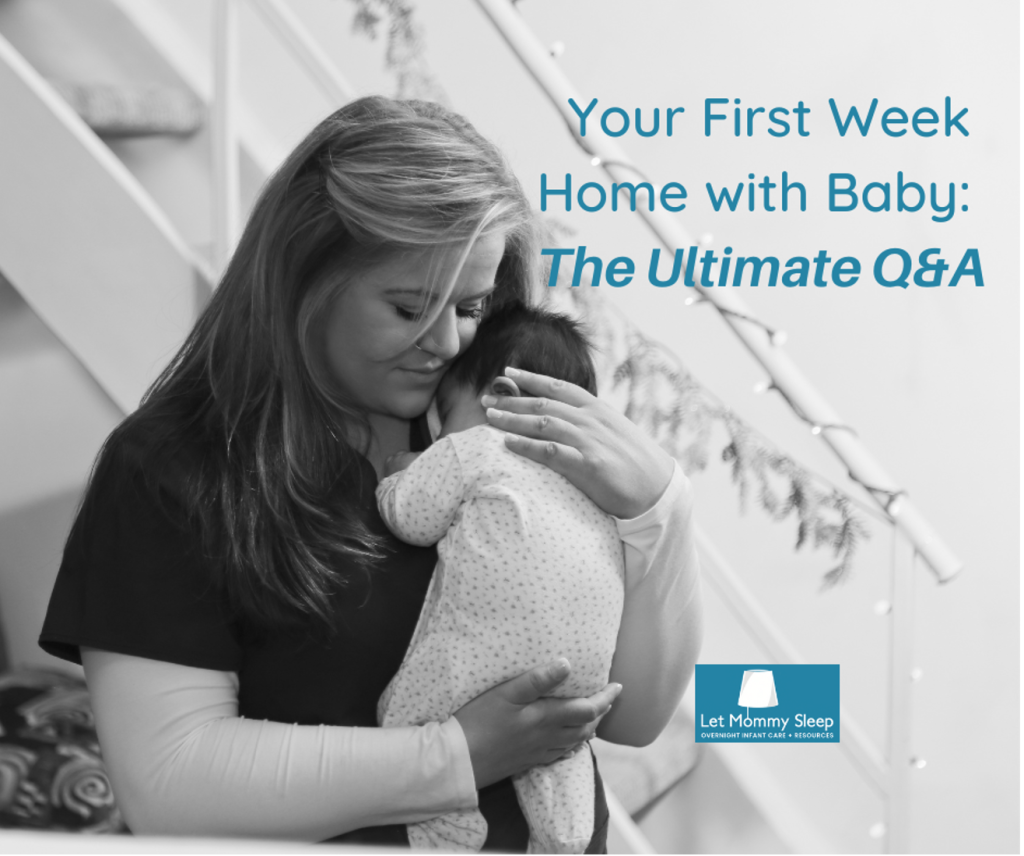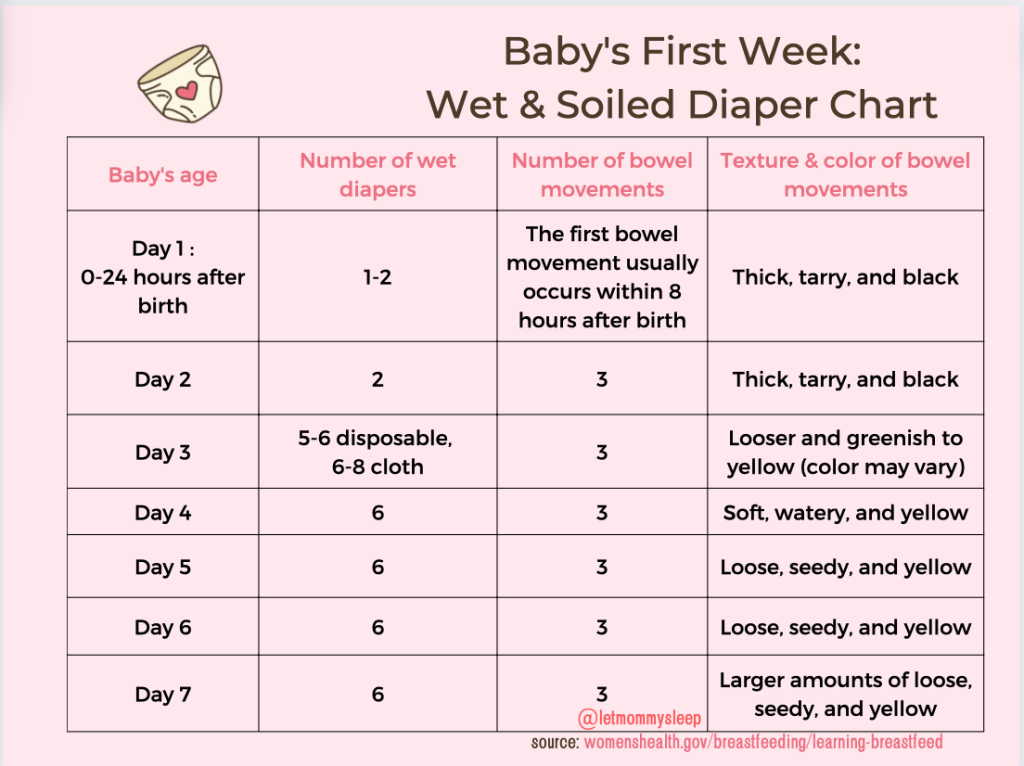Your First Week Home with Baby: Ultimate Q&A
With all the information overload out there for expecting and new parents, our team of Baby Nurses & Night Nannies created this blog, Your First Week Home with Baby: Ultimate Q&A. Bookmark this article for evidence-based answers to frequently asked questions about postpartum and newborn care. #WeAreYourVillage
Your First Week Home with Baby
What can I do to help myself physically heal after giving birth?
An abdominal binder is a postpartum must-have. Social media would have us believe it’s to get back your “pre-baby body,” but there are actually several important health reasons to use a binder. As Bridgett Miller Dixon, NP notes, In addition to helping with pain -particularly after cesarean birth- they help with internal and external healing by adding compression to the abdomen while improving blood circulation and oxygen levels. Binders also keep c-section stitches covered, protecting the area while it heals. They’re easy to find at your local drug store or Amazon and are priced at about $20-$30.
Some manufacturers of binders may claim that the products help a postpartum tummy go back to its pre-pregnancy shape, but there’s no evidence to support this claim. While an abdominal binder will help support your lower back and keep you comfortable, exercise and diet are the only ways to get stronger abs…if that’s your goal!

What are the best foods to eat after giving birth?
After giving birth, your body needs nutrient-dense foods to heal, recover and support milk production if you’re breastfeeding. Some of the best foods to eat postpartum include: lean proteins like chicken, fish, eggs and beans to repair tissue and keep your energy up. Whole grains such as oats, quinoa, and brown rice provide steady energy and fiber to help prevent constipation, which is common after delivery.
Healthy fats like avocado, nuts, seeds, and olive oil support hormone balance and brain health. Adding plenty of leafy greens, colorful vegetables, and fruits gives your body essential vitamins, minerals, and antioxidants to aid recovery. Hydration is also key, drink water throughout the day and include soups or broths, which are soothing and replenishing.
Pre-made dinners in the freezer and snacks at the ready are key. To take you through the day, here are 7 Power Breakfasts for New Parents, packed with nutrients.
How do I know if I have Postpartum Depression (PPD)?
Baby blues usually last up to 2 weeks and include mood swings, crying, and fatigue. Postpartum depression is more severe and lasts longer. Signs of PPD include feelings of hopelessness, loss of interest in your baby, anxiety or thoughts of harm. It’s never wrong to reach out to your doctor in the first 2 weeks. But if symptoms persist beyond 2 weeks or feel overwhelming, reach out to your OB or call the National Maternal Mental Health Hotline (833-852-6262). PPD is common and treatable.
It’s important to know that mild depression can also happen to non-birthing parents. Learn the difference between Baby Blues and PPD here.
How Am I Supposed to Sleep?
The link between sleep deprivation and postpartum depression has been proven but you can learn how to help by reading Sleep Deprivation and Postpartum Depression: Proven Tips to Help Sleep is also recommended to help with post-birth healing, increasing milk production and following safe sleep guidelines for baby. But how the heck are you supposed to get real blocks of sleep when your baby is up every 2-3 hours to feed?
Here are 3 ways to get more sleep:
- Swap blocks of time or entire nights with your partner – Each parent is in charge of baby’s feeding, diapering and soothing back to sleep for half the night. This ensures that you each get at least 5 hours of uninterrupted sleep. If possible, do 2 nights on and 2 nights off to get the deep, restorative sleep that keeps our immune systems strong. If you’re exclusively breastfeeding, simply stay in bed to nurse while your partner does all other care on your “off” night.
- Accept Help – This should be obvious but there’s sometimes a guilt factor in accepting help when caring for our newborns. Now is the time to call on your village for a few hours so you can sleep! If your village is too far away or you don’t have one, you can always call a night doula service. If you’d like to learn more, read What’s a Night Nanny?
- Be ready to sleep when it’s time – Resist the urge to scroll! Practice deep breathing if you find it hard to switch off when it’s time to sleep. A dark room that is always used for sleep and white noise can also help you make the transition from awake to asleep.
Your First Week Home with Baby: Feeding
How to know if baby is eating enough first week?
If you’ve wondered, how big is a newborn’s stomach? you should know a newborn’s stomach is only between the size of a walnut and an apricot in the first week of life. This means that because babies only eat small amounts, they eat frequently! Understanding this helps both breast and bottle-feeding parents understand feeding expectations.
Here’s why:
- If you’re nursing and it seems like baby is always on the breast, that’s perfectly normal! As long as babies are producing wet and soiled diapers, that means they’re getting enough to eat. Remember that skin-to-skin contact is crucial in establishing milk supply too so if it feels like baby is attached to you, that’s not only healthy, it’s helpful!
- Formula feeding parents: don’t let even the tiniest bottle of pre-made formula fool you! Even the 2 ounce bottles the hospital gives away are usually way too big for at least the first week of your newborn’s life. Babies will continue drinking even if they’re full. Like adults, their tummies don’t receive the signal to stop until our stomachs hurt.
- Slow, patient feeding, with lots of time to burp is key. Like babies who are fed from the breast, small, slow and frequent feeds are the norm when bottle feeding.

Is newborn weight loss normal?
Now that we’ve talked about how very small, frequent feeds are the norm for newborns, we should note that even with all that eating, it’s actually expected for babies to lose weight in the first few days of life. Babies are born with some extra fluid, so a healthy newborn is expected to lose 7% to 10% of the birth weight.
So if it seems like your baby is eating all the time but losing weight, don’t worry because that weight will come back on within about the first 2 weeks after being born. Of course you should always drop by your pediatrician for a weight check if you want to be sure baby is developing normally.
I’m breastfeeding…when will my milk come in?
It can take 3-5 days for your milk to come in and these days are usually the hardest because your newborn is waking up and hungry. Common -but not always- reasons for a delay in milk production are c-section, complicated delivery or obesity.
Here are tips to help stimulate milk production:
- Have friends and family take care of you, so you can feed the baby. Stress, hunger and sleep deprivation can delay lactation. Friends and family can be overwhelming, but it’s important to have someone whose job is to look after you. They need to be sure you’re eating, drinking and resting. (Not adding more work!)
- No time at the breast is wasted time. Even if it’s just a little bit at a time, breast milk can be transferred to baby drop by drop, even if the baby is primarily getting nutrition from formula.
- Don’t wait until baby is screaming to nurse – Allowing baby to be skin to skin with you before latching can make nursing calm and give your body a chance to get ready for feeding. Non-feeding caregivers should also learn the signs of hunger to be ready to hand baby over!
- Skin to skin – You and your baby are literally a feeding dyad…skin to skin works when increasing milk supply.
- Check your latch– Nursing should never hurt. If it’s painful for you, contact La Leche League, your pediatrician or a lactation counselor who can check baby’s latch.
- Hand express or pump – Pumping both breasts after baby has finished nursing can help stimulate milk.
Read more from an IBCLC In My Milk Isn’t In…What Do I Do?
Your First Week Home with Baby: Newborn Sleep
Is my newborn sleeping too much?
There is a wide range of “normal” when it comes to infant sleep. Babies don’t develop regular sleep cycles until about 6 months of age. There may be a few long stretches of sleep while baby is still in the sleepy newborn stage but they typically wake up every 2-3 hours because they’re hungry.
Babies of healthy weight don’t usually need to be woken up to feed. Unless you have specific directions from the hospital or doctor to wake your newborn, it’s okay to allow them to feed on demand. They will typically make up for a “lost” feed with cluster feeds later.
Where should my baby sleep?
The American Academy of Pediatrics (AAP) recommends room-sharing but not bed-sharing for the first 6 months. This means that your baby is sleeping in the same room as you, but not in the same bed. A flat bassinet next to your bed is an ideal set-up. Baby should be alone (no blankets or stuffed animals), on a flat, firm mattress and flat on their back to adhere to safe sleep recommendations. Read the 10 Steps to Safe Sleep for Baby here.

What should my baby wear to sleep?
The rule of thumb is that baby should wear what you would be comfortable in, plus 1 layer. For example, a recommended outfit for baby to sleep in would be a onesie, footed pajamas and a snug swaddle. At this age baby’s movements are not always purposeful and the reflexive movements they have can keep them awake. A snug swaddle will help.
We always like to remind parents of what RN Rachelle said in this Mom.com article about baby hats. I see hats move a lot while babies are sleeping! Take them off if you’re both going to sleep.
Newborn not sleeping at night — what to do?
If you find yourself Googling ‘newborn not sleeping at night what to do,’ you’re not alone. In the first week, babies often mix up day and night. The best step is to keep daytime bright and interactive, and nighttime calm and quiet so your baby learns the difference. Remember it’s also normal for newborns wake up every 2 to 3 hours to feed.
Your First Week Home with Baby: Soothing
Is it normal for my baby to make this much noise?!
Yes! Grunting and newborn “squawks” are perfectly normal during sleep. Babies typically make these noises because their bodies are getting used to digesting milk or formula…something they never had while in the womb! To put it another way, your baby is having bowel movements for the first time in their life and that can cause them to strain. Of course if you are ever worried or something doesn’t feel right, contact your pediatrician.
Learn more about newborn breathing patterns at Newborn Breathing Patterns: What’s Normal?
How do I swaddle?
There’s a reason every baby looks like a little burrito in the hospital- swaddling is very soothing and comforting to them. Swaddling mimics the feeling of the womb and also keeps babies from waking themselves as their arms and legs experience unintentional reflexes. Here’s how to do it!
Remember to use an actual swaddle blanket, which is larger than the towels and baby blankets we typically see for sale. Swaddle blankets also have a bit more stretch in the fabrics to keep babies snug. Do not use a weighted swaddle blanket as they are not proven safe for sleep.
I’ve tried everything and my newborn is still crying! What should I do?
First, trust your instincts. Remember that you are your baby’s primary caregiver and the expert in your baby. If something doesn’t feel right or if you have concerns, don’t hesitate to contact your pediatrician or primary care provider.
Second, be sure your baby isn’t hungry. Since newborns can only eat less than an ounce at a time, they might be hungry even though they just ate a little while ago. If they’re not hungry try one of the Top 10 Ways to Calm a Fussy Baby.
There are lots of newborn care experts out there but you are the expert in YOUR baby. If you feel that something isn’t right, contact your pediatrician. Newborns are typically “sleepy” for several weeks so if your baby is crying and inconsolable it’s best to rule out any medical issues. And if baby is crying and you feel like you’re losing your patience, it is okay to place them safely in a crib while you contact the doctor or regain your patience.
How Do I Sort Through All the Baby Advice on the Internet?
If you’ve ever typed a newborn or postpartum question into Google, you’ve probably been hit with thousands of conflicting answers. The best way to sort through all the information on the internet is to stick with evidence-based sources such as the American Academy of Pediatrics (AAP), the American College of OBGYN’s and organizations dedicated to maternal and infant health. Lean on licensed professionals like pediatricians, nurses and lactation consultants rather than influencers or forums.
Most importantly, remember that your baby and your recovery are unique, so while general guidelines are helpful, your pediatrician and OB/GYN are your best resources. Here are the Best Newborn Care Websites You’ve Never Heard Of.
Week One Survival Checklist
In addition to pre-made meals, diapers and baby gear, here’s a quick checklist of other items to prepare for your first week home:
- Abdominal binder or support garment
- Sleep blocks scheduled with partner or outside help
- Pediatrician contact info on fridge
- Daily and Weekly Cleaning Lists ***these are not for you, they’re for well-meaning visitors who want to help!
- Breastfeeding support contact information
- Emergency numbers: pediatrician after-hours, hotline for maternal mental health
- Bookmark evidence-based websites for data based answers you might need in the night
If you have questions, our team of night nurses and doulas is here for you. Contact us to schedule a postpartum or virtual visit. Would you like the booklet version of the Guide? Download here!
Categories
- Corporate Care & Partners
- COVID19 Archive
- En Espanol
- Expert Guides
- Hiring a Night Nanny
- Infant Safety
- Infant Sleep Hub
- Newborn Care
- Postpartum Health
- Twins & Multiples
- Work as a Night Doula
- zPost Archives
